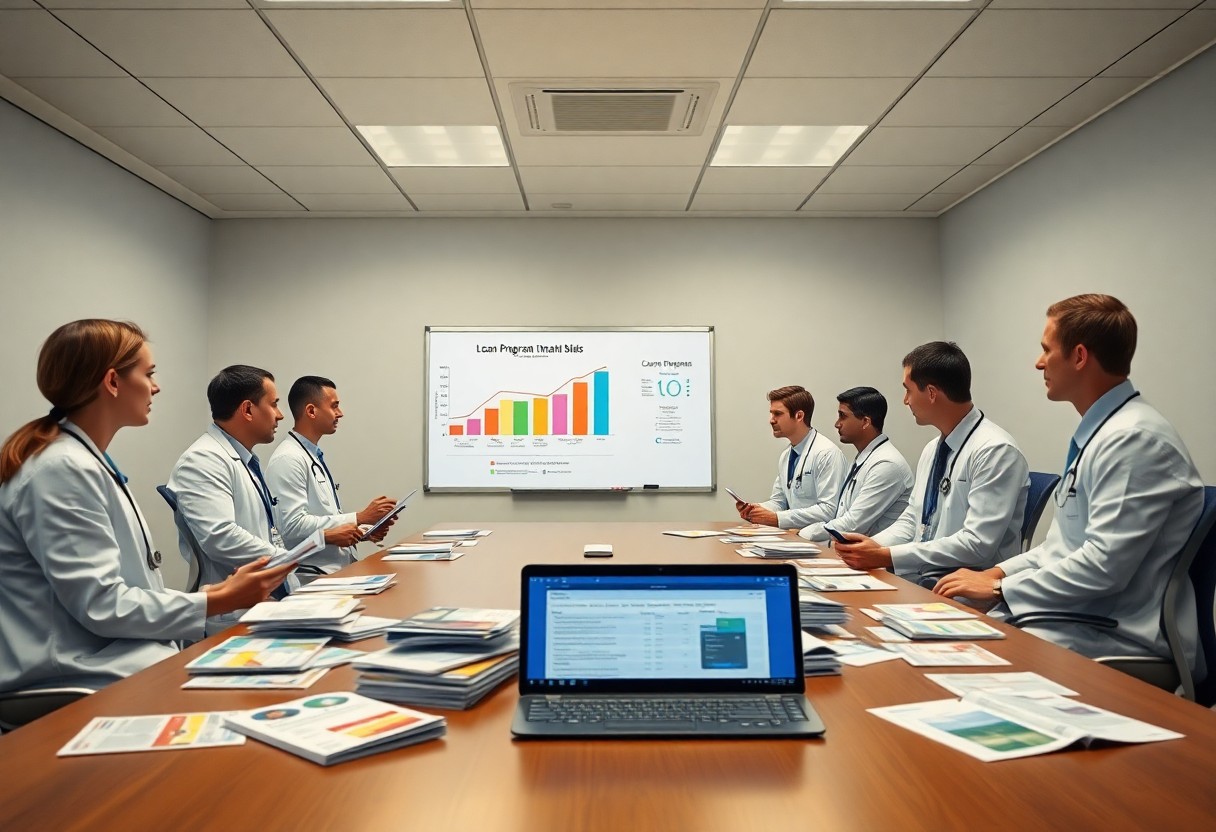Over the years, various loan programs tailored for doctors have emerged, each designed to meet different career stages. Whether you are a medical student, a resident, or a seasoned practitioner, selecting the right loan option is vital for your financial success. This guide will help you navigate your choices, allowing you to assess your specific needs and find the best financing solution that aligns with your professional journey.

Mapping Your Career Journey: Identifying Key Milestones
Your career as a doctor unfolds through various stages, each presenting unique opportunities and challenges. Recognizing key milestones allows you to tailor your financial strategies and loan options effectively. Whether you’re just starting, in mid-career, or preparing for retirement, aligning your financial decisions with your career trajectory ensures you make informed choices that support your professional and personal goals.
Early Career: Understanding Your Financial Foundations
In the early stages of your career, establishing a sound financial foundation is crucial. You may face significant student debt from medical school, and understanding your loan options and repayment plans will set the tone for your financial future. Prioritize your budgeting and consider programs tailored for new physicians to ease the transition into financial independence.
Mid-Career: Balancing Debt and Future Earnings
As you progress in your career, managing your debt while maximizing your earning potential becomes pivotal. At this stage, you might have a stable income, yet you also face higher living costs and professional expenses. Carefully evaluating your repayment strategies and considering refinancing options can help you maintain a healthy financial balance as you navigate career advancements.
During mid-career, you may experience increased financial obligations, including family needs and professional development. This is a critical time to reassess your financial strategies, focusing on effective debt management and investment opportunities. For instance, consolidating loans can streamline your payments and reduce interest rates, ultimately freeing up capital for future endeavors, such as purchasing a home or investing in continuing education.
Late Career: Positioning for Retirement and Legacy
In your later career stages, the focus shifts toward planning for retirement and establishing a legacy. You should assess your retirement funds to ensure they align with your desired lifestyle post-practice. Additionally, evaluating estate plans and the potential impact of your financial decisions on family members can shape how you approach this final career phase.
As you near retirement, considering the implications of your financial decisions on your legacy becomes crucial. Maximizing contributions to retirement accounts and strategically planning withdrawals can enhance your financial security. Moreover, discussing your plans with a financial advisor helps ensure that your estate reflects your values, providing support for loved ones while leaving a lasting impact on your community or charitable interests.
Navigating Financial Products: Beyond Conventional Wisdom
Exploring financial products tailored to your unique needs as a physician goes beyond traditional options. Alternative lending solutions provide innovative approaches designed specifically for doctors, addressing challenges like student loan debt and income variability. Familiarizing yourself with these options can unlock opportunities and ease your financial journey, allowing for a more strategic approach to budgeting and investment.
Special Loan Structures Tailored for Physicians
Special loan structures designed for physicians recognize the unique financial circumstances you face. These tailored programs often feature flexible repayment terms, lower down payment requirements, and loan amounts that accommodate high educational debt. By taking advantage of these loans, you can secure favorable financing that aligns with your career stage, maximizing your potential for growth while minimizing financial strain.
Evaluating Interest Rates and Terms: What Matters Most
Interest rates and loan terms significantly impact your long-term financial health. Fixed rates may provide stability, while variable rates can result in lower payments initially. Scrutinizing the complete loan terms, including repayment periods and additional fees, is crucial to find the best fit. In this dynamic landscape, understanding how different rates affect monthly obligations and total repayment costs can empower you to make informed decisions that support your financial goals.
When evaluating interest rates, consider not only the initial rates but also how they change over time. A lower introductory rate may lead to higher long-term costs if it adjusts upward. Look for comparisons on annual percentage rates (APRs) for a comprehensive view, including all associated fees. Different lenders offer various term lengths; shorter terms often result in higher monthly payments but can save you thousands in interest, while longer terms provide flexibility, especially during residency or fellowship periods. Tailoring these factors to your career stage ensures your choice aligns with your financial strategy while you grow in your profession.
Leveraging Professional Networks: Finding the Right Advice
Utilizing professional networks can significantly enhance your understanding of loan programs and financial strategies tailored for doctors. Engage with colleagues, attend industry conferences, and participate in online forums to gather diverse insights. Your peers can offer firsthand experiences and valuable recommendations, helping you make informed decisions based on what has worked for others in similar career stages.
Connecting with Peers: Insights from Fellow Doctors
Talking to fellow doctors can provide invaluable perspectives on navigating loan options. Colleagues in your network may share their successes or pitfalls, helping you avoid costly mistakes. Keep an open dialogue about financial strategies, and explore each other’s experiences to identify the most suitable loan programs for your current career stage.
Collaborating with Financial Advisors: Key Questions to Ask
Before finalizing your choice of financial advisor, clarify their experience with physician-specific loan programs. Discuss their understanding of income stability in the medical profession and inquire about their fee structures. In addition, seek to understand their approach to holistic financial planning, including student loans, mortgage options, and investment strategies that cater to your unique financial situation.
When meeting with a financial advisor, ask about their familiarity with the unique financial challenges faced by doctors, including high debt-to-income ratios and varying income levels based on specialty. Inquire how they personalize loan strategies to align with your career trajectory. Furthermore, understanding their stance on student loan forgiveness programs and tax strategies relevant to healthcare professionals can provide insight into their expertise. Clarify how often they will review your financial plan and adjust it according to your evolving career stage.
Customizing Your Loan Strategy: Aligning with Professional Goals
Tailoring your loan strategy to align with your professional goals can significantly impact your financial future. As you transition through various stages of your medical career, consider how your ambitions—whether starting a practice, pursuing advanced specialization, or managing student debt—inform your lending options. Evaluate loan terms, interest rates, and repayment flexibility against your career timeline to create a financial roadmap that supports your aspirations.
Competitive vs. Compassionate Lending: Choosing Your Philosophy
Your lending philosophy can shape the choices you make. Opting for competitive lending often means seeking the lowest interest rates, while compassionate lending focuses on understanding your unique circumstances and providing personalized support. Weigh the benefits of lower costs against the potential for better service and flexibility in repayment options that compassionate lenders might offer.
Risk vs. Reward: Calculating Long-term Implications
Evaluating risk versus reward involves considering how your loan choices impact your financial trajectory. High-stakes loans might offer lower initial payments but could lead to higher long-term interest expenses. On the contrary, conservative loans with manageable terms can provide stability but limit access to larger funding amounts. Assessing these elements is vital for ensuring that your decisions align with your long-term financial health and professional ambitions.
Conducting a thorough analysis of various loan scenarios helps you gauge potential risks and rewards. For instance, a typical medical school graduate may face an average debt of $200,000, influencing the choice between a lower-rate but riskier adjustable-rate mortgage and a higher-rate fixed mortgage that offers predictable payments. By considering how each option will affect your financial freedom over time, you ensure your loan strategy not only meets immediate needs but also safeguards your future goals in medicine.
The 4 Most Common Pitfalls and How to Avoid Them
The journey to securing the right loan program can be fraught with missteps that may cost you time and money. Identifying these pitfalls early can save you from financial headaches later. By understanding these common challenges, you can make informed decisions that align with your career stage and financial goals.
Misunderstanding Loan Repayment Options
You may find yourself confused by the variety of repayment options available. From standard to income-driven plans, the differences can significantly impact your financial trajectory. Take the time to analyze each option, considering your income, debt levels, and lifestyle choices, to find a plan that suits your long-term needs.
Overlooking Hidden Costs and Fees
Hidden costs and fees can easily inflate your loan’s total price, making it imperative to scrutinize every detail of your agreement. Look beyond the interest rates; origination fees, prepayment penalties, and even insurance can add significant expenses that might not be immediately apparent. Always ask for a complete breakdown of costs before committing.
When evaluating loan agreements, consult with financial advisors or mentors in your field who can help identify these hidden fees. Many loan agreements may include charges like document preparation or credit report fees that aren’t included in the quoted interest rate. Failing to account for these can lead to unexpected financial burdens, significantly affecting your loan’s affordability over time and potentially prolonging your repayment period. Take the time to read the fine print and ensure you fully understand all associated costs before making a decision.
To wrap up
Drawing together the various loan programs for doctors, it’s crucial to evaluate each option based on your career stage and financial goals. Consider factors such as interest rates, repayment terms, and eligibility to ensure you select a program that aligns with your future plans. Assess your current financial situation and projected income, and don’t hesitate to seek personalized advice from financial advisors or loan specialists. Making informed decisions will empower you to manage your loans effectively, allowing you to focus on your medical career and long-term aspirations.




